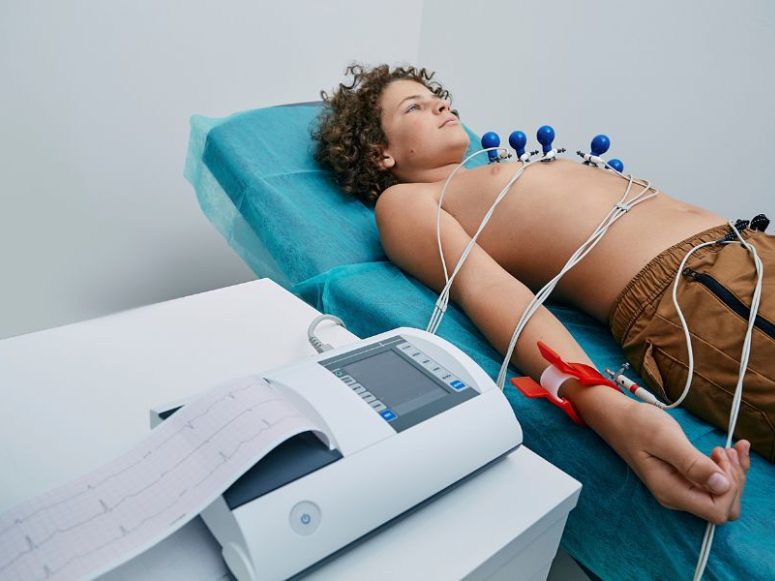Key Points
- Chest pain or discomfort is the most common reason for EKG testing - any chest pain lasting more than a few minutes or accompanied by shortness of breath, sweating, or nausea requires immediate EKG evaluation.
- Risk factor screening recommends EKGs for adults over 40 with diabetes, high blood pressure, family history of heart disease, or smoking history, as these conditions increase cardiac event risk by 200-400%.
- Pre-operative requirements mandate EKG testing before most surgeries for patients over 50 or with cardiac risk factors, ensuring safe anesthesia administration and identifying potential surgical complications.
Understanding when you need an EKG can be crucial for protecting your heart health and potentially saving your life. Electrocardiogram testing is recommended in various situations, from emergency symptom evaluation to routine preventive screening, making it important to know when this valuable test is appropriate.
EKG testing serves multiple purposes in healthcare, from diagnosing acute heart problems to screening for hidden cardiac conditions. Knowing when to seek EKG testing ensures you receive appropriate cardiac evaluation when needed while avoiding unnecessary testing.
Emergency Situations Requiring Immediate EKG
Chest Pain and Cardiac Symptoms
Any chest pain that lasts more than a few minutes, especially if accompanied by other symptoms, requires immediate EKG evaluation. This includes crushing chest pain, pressure sensations, burning pain, or discomfort that radiates to the arms, neck, jaw, or back.
Associated symptoms that make EKG testing urgent include shortness of breath, sweating, nausea, vomiting, dizziness, or feelings of impending doom. These symptoms may indicate a heart attack requiring immediate medical intervention.
Heart Palpitations and Rhythm Disturbances
Irregular heartbeats, racing heart, or the sensation that your heart is skipping beats warrant EKG evaluation, particularly if these symptoms are new, persistent, or accompanied by other concerning signs.
Palpitations associated with chest pain, shortness of breath, dizziness, or fainting require immediate EKG testing to identify potentially dangerous heart rhythm abnormalities.
Syncope and Near-Fainting Episodes
Fainting (syncope) or near-fainting episodes, especially those that occur without obvious cause, require EKG evaluation to rule out cardiac causes. Heart rhythm abnormalities can cause sudden loss of consciousness and may be life-threatening.
Episodes of dizziness, lightheadedness, or feeling like you might faint, particularly during physical activity, should prompt EKG testing to evaluate cardiac function.
Routine Screening and Preventive Care
Age-Based Screening Recommendations
Adults over 40 should consider baseline EKG testing as part of comprehensive health assessments, particularly if they have risk factors for heart disease. This baseline provides valuable comparison for future testing.
Some medical organizations recommend routine EKG screening for adults over 50, even without symptoms, to detect silent heart conditions that could lead to serious complications.
Risk Factor Assessment
Patients with multiple cardiovascular risk factors benefit from regular EKG monitoring. These risk factors include high blood pressure, diabetes, high cholesterol, smoking, obesity, and sedentary lifestyle.
Family history of heart disease, particularly sudden cardiac death or heart attacks at young ages, may warrant earlier and more frequent EKG screening to detect inherited cardiac conditions.
Occupational and Athletic Screening
Certain occupations requiring physical demands or safety responsibilities may require EKG testing to ensure workers can safely perform their duties without cardiac risk.
Athletes, particularly those participating in competitive sports, often need EKG screening to identify conditions that might cause sudden cardiac death during intense physical activity.
Medical Conditions Requiring EKG Monitoring
Diabetes and Metabolic Conditions
Diabetes significantly increases the risk of heart disease, making regular EKG monitoring important for diabetic patients. Diabetic heart disease can develop silently, making screening essential for early detection.
Other metabolic conditions such as thyroid disorders can affect heart rhythm and function, warranting EKG testing when these conditions are diagnosed or poorly controlled.
Hypertension Management
High blood pressure can cause changes in the heart over time, including enlargement of heart chambers and electrical conduction abnormalities. Regular EKG testing helps monitor these changes and guide treatment decisions.
Patients with poorly controlled hypertension or those starting new blood pressure medications may need EKG monitoring to assess treatment effects and detect complications.
Medication Monitoring
Certain medications can affect heart rhythm and electrical conduction, requiring EKG monitoring during treatment. These include some antibiotics, antiarrhythmic drugs, psychiatric medications, and chemotherapy agents.
Patients starting medications known to affect cardiac function should receive baseline EKG testing and periodic monitoring to detect potential cardiac side effects.
Pre-Operative and Procedural Requirements
Surgical Risk Assessment
Most patients over 50 or those with cardiac risk factors require pre-operative EKG testing before surgery. This testing helps assess cardiac risk and guides anesthetic management during procedures.
The complexity and duration of planned surgery influence EKG requirements, with more extensive procedures typically requiring more comprehensive cardiac evaluation including EKG testing.
Anesthesia Safety
EKG testing before anesthesia helps identify heart conditions that might complicate anesthetic administration or surgical procedures. This information allows anesthesiologists to modify their approach and prepare for potential complications.
Patients with known heart conditions or those taking cardiac medications typically require pre-operative EKG testing regardless of age to ensure safe anesthesia administration.
Symptom-Based EKG Indications
Shortness of Breath
Unexplained shortness of breath, particularly if it occurs with minimal exertion or at rest, may indicate heart problems requiring EKG evaluation. Heart failure and other cardiac conditions can cause breathing difficulties.
Shortness of breath that worsens when lying flat or that awakens you from sleep may indicate heart failure or other serious cardiac conditions requiring immediate EKG assessment.
Fatigue and Exercise Intolerance
Unusual fatigue, particularly if it's new or associated with decreased exercise tolerance, may indicate heart problems. EKG testing can help identify cardiac causes of fatigue and exercise limitation.
Fatigue accompanied by other symptoms such as shortness of breath, chest discomfort, or swelling may indicate heart failure or other cardiac conditions requiring evaluation.
Swelling and Fluid Retention
Swelling in the legs, ankles, or abdomen, particularly if it's new or worsening, may indicate heart failure requiring EKG evaluation. Heart failure can cause fluid retention and swelling throughout the body.
Rapid weight gain due to fluid retention, along with shortness of breath or fatigue, may indicate worsening heart failure requiring immediate medical evaluation including EKG testing.
Follow-Up and Monitoring Situations
Known Heart Conditions
Patients with diagnosed heart conditions such as coronary artery disease, heart failure, or arrhythmias typically require regular EKG monitoring to assess disease progression and treatment effectiveness.
The frequency of EKG monitoring depends on the specific condition, its severity, and the treatments being used. Some patients may need monthly monitoring, while others require testing only annually.
Medication Adjustments
Changes in cardiac medications often require EKG monitoring to assess treatment effects and detect potential side effects. This is particularly important for medications that affect heart rhythm or electrical conduction.
Starting new cardiac medications or adjusting dosages typically requires follow-up EKG testing to ensure the medications are working properly and not causing adverse effects.
Special Populations and Considerations
Women and Cardiac Risk
Women may experience different heart attack symptoms than men, including fatigue, nausea, and back pain rather than classic chest pain. These atypical symptoms may warrant EKG evaluation even when they seem unrelated to heart problems.
Pregnancy can affect heart function and rhythm, and certain pregnancy-related conditions may require EKG monitoring to ensure maternal and fetal safety.
Elderly Patients
Older adults have increased risk of heart disease and may benefit from more frequent EKG screening, even without obvious symptoms. Age-related changes in the heart can be detected through regular EKG monitoring.
Elderly patients taking multiple medications may need EKG monitoring to detect drug interactions or cumulative effects on heart function.
When EKG Testing May Not Be Necessary
Low-Risk Individuals
Young, healthy individuals without risk factors or symptoms typically don't need routine EKG testing unless required for specific purposes such as sports participation or occupational requirements.
Recent Normal Testing
Patients with recent normal EKG results and no new symptoms or risk factors may not need repeat testing unless clinically indicated or required for specific medical purposes.
Making the Decision
Consulting Healthcare Providers
When in doubt about whether you need EKG testing, consult with your healthcare provider who can assess your individual risk factors, symptoms, and medical history to determine appropriate testing.
Emergency vs. Routine Testing
Distinguish between situations requiring immediate EKG testing (such as chest pain or palpitations) and those where routine scheduling is appropriate (such as preventive screening or pre-operative assessment).
Conclusion
Understanding when you need an EKG helps ensure you receive appropriate cardiac evaluation when necessary while avoiding unnecessary testing. From emergency symptom evaluation to routine preventive screening, EKG testing plays a crucial role in maintaining heart health and detecting cardiac conditions early.
Whether you're experiencing symptoms, have risk factors for heart disease, or need pre-operative assessment, knowing when EKG testing is appropriate helps you make informed healthcare decisions and protect your cardiovascular health. When in doubt, consult with your healthcare provider to determine if EKG testing is right for your situation.
References:
[1] American Heart Association. "Who Needs an Electrocardiogram?" https://www.heart.org/en/health-topics/consumer-healthcare/what-is-cardiovascular-disease/electrocardiogram-ecg-or-ekg
[2] American College of Cardiology. "Guidelines for EKG Testing." https://www.acc.org/
[3] U.S. Preventive Services Task Force. "Screening for Cardiovascular Disease Risk." https://www.uspreventiveservicestaskforce.org/








